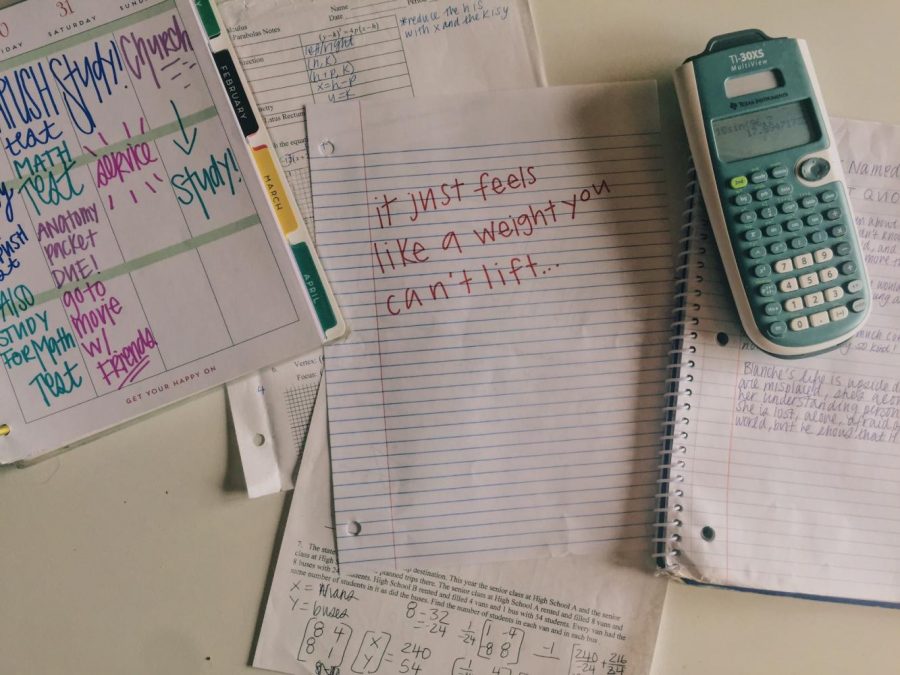Part 5: What is Anxiety Doing to students?
May 18, 2017
You come home with a heavy backpack as usual. You’ve got a thousand things to do, and it’s already 7 PM. Last night you went to bed at midnight, so you actually got an hour more of sleep than usual.
You down a cup of coffee despite the sun already being down because practice ran late, but you forsake the shower because you only have so much precious time to study for one of three AP classes.
Around 11 PM, with papers stacked or strewn and notes done and redone, you start to wonder why you feel so empty or angry.
This may sound like an exaggeration, but for some students, it’s an everyday reality that affects their mental well being. So why do students overload themselves, and what’s the mental result of it all?
Social worker Stephanie Schuette said 75-80 percent of students who enter her office are coming in because of academic-related stress and anxiety, and often their complaints are centered on students’ work volume.
She said the cases range from students whose friends directed them to Schuette for help, to students who had overnight panic attacks and recognize their situation isn’t healthy.
“Some have thoughts like ‘I can’t get out of this’ and ‘why do I even try’,” said Schuette.
Sophomore Riley Matthews was placed into accelerated mathematics her freshman year despite her hesitancy. She said she’d cry in the bathroom during CLAWS, because the stress got to be too much.
“It was a huge step to take on-level math, for me, but it was so much better,” said Matthews.
Matthews said part of the pressure that undermines students comes from the expectation that they earn straight A’s, something she said some people just can’t reach.
AP US History teacher Lauren Hall said part of the reason students overwhelm themselves in high school is that they’re given an unrealistic picture of what’s required to get into college. They often believe they need several AP courses and high GPAs on their transcripts, as well as a variety of extracurriculars.
In sophomore year, students and parents go into meetings about how many APs a student should take to get into UGA or Georgia Tech. Hall said this event puts an unfair amount of pressure on students. Also, parents may panic if they think their children haven’t taken enough APs or advanced classes to get into a desirable college.
Hall and Schuette said that because students are so involved in trying to increase their AP numbers for college, they often lose focus of what they actually enjoy.
“They end up letting go of what interests them, and I think it’s tragic,” said Hall.
This ties into how students are unhealthily coping with stress. Schuette said there are many optimal ways to blow off steam, but because of the pressure to be successful, even relaxation has become goal-oriented.
A hypothetical example she gave was that a student might opt to run three miles, instead of just hanging out so that they can consider themselves “productive.”
Freshman Madeline Feely, who takes mainly honors classes and one AP course, said the stress that comes from worrying about school can be overwhelming.
“When you start worrying about it so much, it just feels like a weight you can’t lift,” said Feely.
This year she took AP Government and ultimately came to the conclusion that she doesn’t want to overload herself on AP classes next year. “I wish I didn’t take AP gov because there’s lots of work I just wasn’t ready to take on,” said Feely.
Schuette said she believes peer pressure plays a major role in what rigor courses, such as AP literature or advanced algebra, students take on.
However, academics or external pressures aren’t the only cause of unhealthy levels of stress and anxiety. It can also be innately built into an individual.
“A person’s genetics, biochemistry, environment, history, and psychological profile can all contribute to the development of anxiety disorders,” said the New York Times’ “Generalized Anxiety Disorder” health guide.
The Times said 50 percent of people with panic disorders and 40 percent of people with anxiety have someone in their family with a disorder.
AP US History teacher Bob Bordas said, “I talked to one student and they said ‘I didn’t go to bed last night.’” This student was busy studying. He said overdoing a class load will take a physical and mental toll on students.
Hall said students feel pressure to compete with their peers. With students constantly trying to compete with each other in every field possible, they start to have a negative effect on the student’s self-esteem and self-image.
“It’s a little excessive, the amount of pressure we put on ourselves and maybe we just need to take a step back and think about our health,” said Feely.
